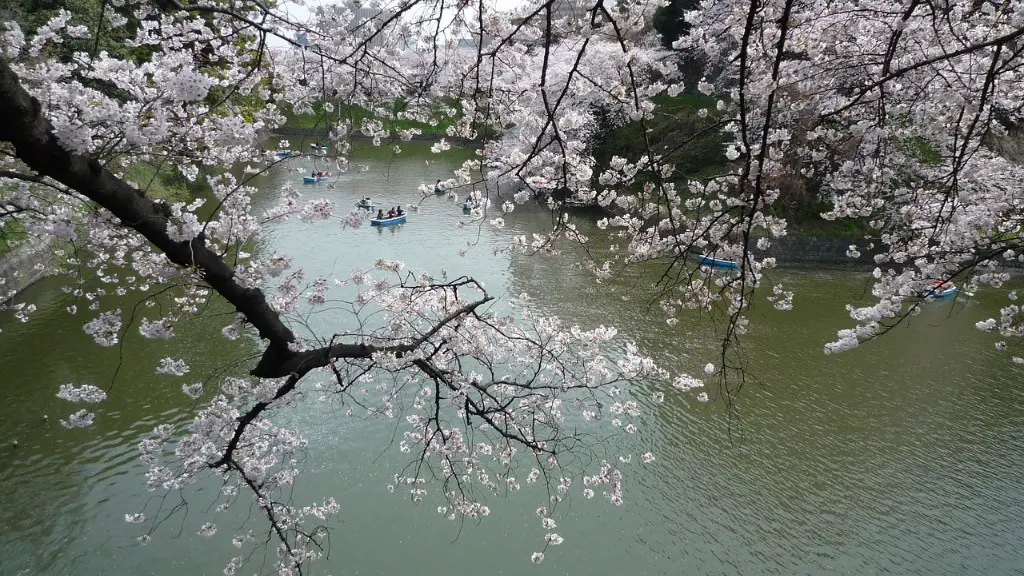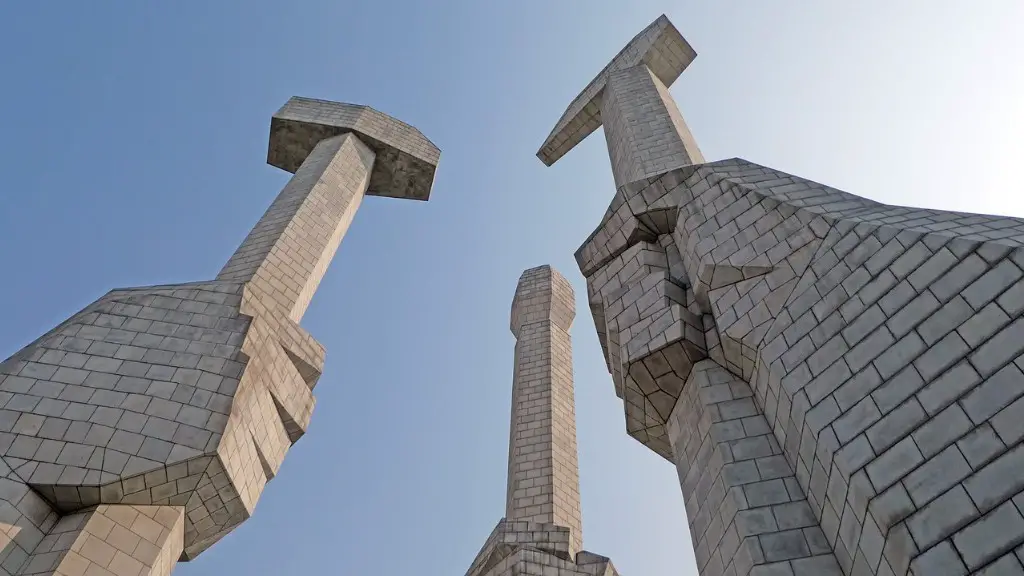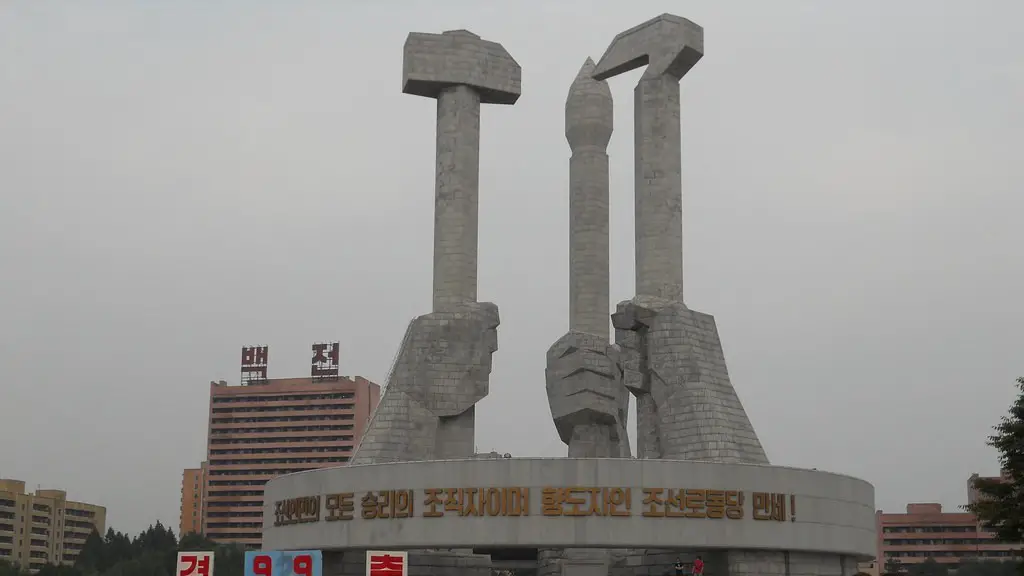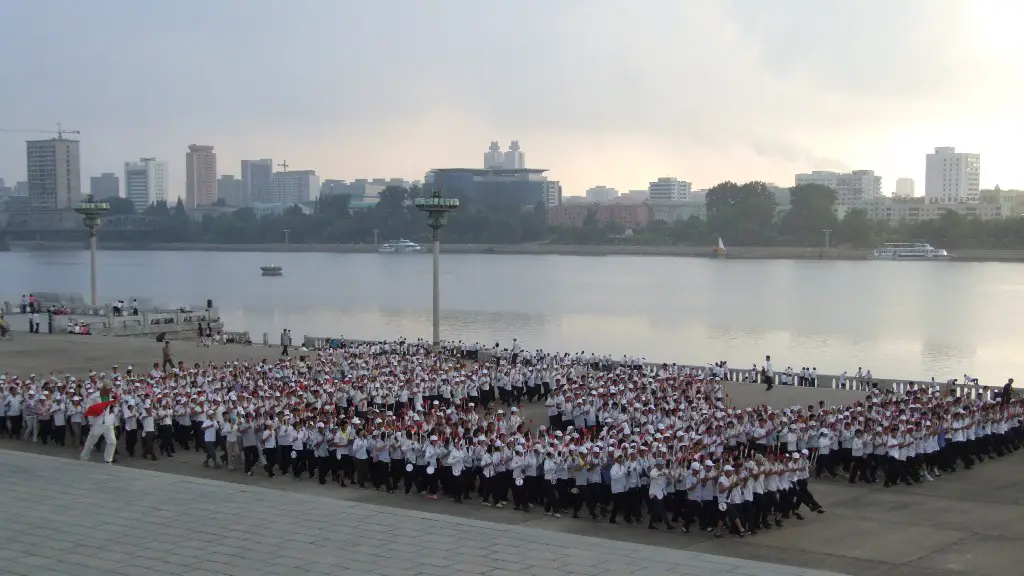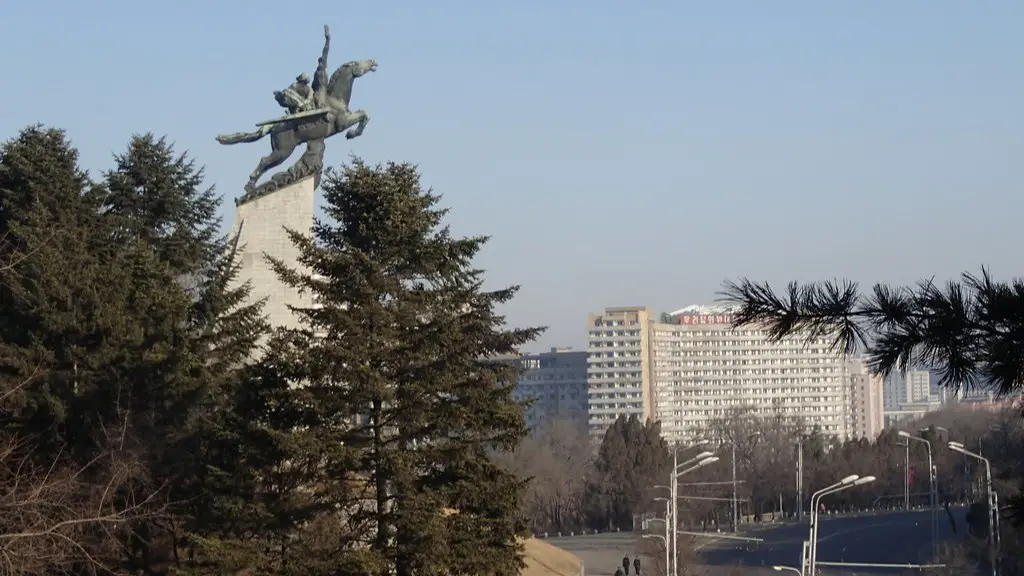The conflict between North and South Korea has been ongoing for decades, with tensions often rising and falling between the two nations. Starting with the division of the peninsula following the Korean War in 1953, South Korea has been under a pro-western, democratic government while North Korea has been under an oppressive, Soviet-style dictatorship. Since then, the two countries have been at odds in many areas, with their differing political systems and ideologies being one of the primary causes of their conflict.
The border between the two countries is known as the Korean Demilitarized Zone. It is a heavily fortified stretch of land that stretches across the entire length of the peninsula, serving as both a physical and symbolic sign of the divide between South and North Korea. North Korea has often used the DMZ as a staging ground for hostile acts against the South, such as border crossings and the sending of missiles over the border.
The differences between North and South Korea are stark, both in terms of politics and economics. South Korea is prosperous, democratic, and open to foreign investment, while the North is isolated, impoverished and ruled by a totalitarian regime. This gulf in standards of living often leads to resentment between the two countries, with each seeing the other as an ideological and economic threat.
Another major source of tension between North and South Korea is unification. Although both countries technically share the same language and culture, North Korea insists that any attempt to unify the two nations will only come under its sovereignties. This has often resulted in standoffs between the two sides, as each tries to assert its dominance over the other. The most extreme of these came in 2008, when a naval skirmish broke out between South and North, resulting in several casualties.
In addition to the political, ideological, and economic differences between North and South Korea, there is one more important factor causing the conflict: global powers. North Korea’s close ties to China and Russia, as well as its nuclear weapons program, has only further deepened the divide between the two countries, as these countries view the two Koreas being separate and distinct entities. The United States, meanwhile, has often sought to find a peaceful solution to the conflict, though their efforts have been largely unsuccessful due to North Korea’s unwillingness to compromise.
The conflict between North and South Korea has become increasingly complex and convoluted over the years, with no easy solution in sight. To this day, the two countries remain locked in a state of hostility and distrust, with tensions rising and falling depending on the current geopolitical situation. In order to truly understand why South and North Korea fight, one must look at all of the underlying reasons for their animosity, from ideological differences to global powers.
The Role of Military
The Korean peninsula is one of the most militarized regions in the world, an effect of the war that split North and South in 1953 and resulted in an armistice, rather than a formal peace treaty. Thousands of troops from both sides remain on guard near the Korean Demilitarized Zone (DMZ) that serves as a buffer between the two states. On a regular basis, South and North Korea conduct military exercises separately or jointly, primarily in the demilitarized zone.
Both North and South Korea maintain active armed forces, with the South having a far larger military. North Korea currently has an estimated 1.2 million active duty military personnel, compared to South Korea’s 655,000. Although North Korea’s relatively smaller military power could still present a potential threat to South Korea in some areas, much of the military activity on the peninsula is merely a posturing and deterrence by both sides.
Recently, South Korea has attempted to de-escalate tensions on the peninsula through dialogue and cooperation. This includes inviting North Korean officials to talks and engaging in joint military drills with the South’s American allies. Though these efforts have not completely resolved the conflict between the two sides, they have resulted in progress toward a formal peace treaty, as well as a reduction in the number of military encounters in the demilitarized zone.
It is clear that the role of military forces plays an important role in the conflict between South and North Korea. While it is largely used as a form of deterrence, at times it is also used to create tension between the two countries. This is often done through provocative military exercises and threats of war, which can increase the risk of an actual armed conflict taking place.
Diplomatic Efforts
In addition to the military, diplomacy has also been utilized by both sides in an attempt to resolve their differences. The South Korean government has sought to build closer relations with North Korea through outreach efforts, such as inviting North Korean officials to talks and engaging in humanitarian aid programs. South Korea has also been the driving force behind recent economic cooperation initiatives, such as the Kaesong Industrial Complex, that seek to benefit both countries.
The United States has also been involved in diplomatic attempts to resolve the conflict. Through the now-defunct “Six-Party Talks”, the US and other nations, such as China, Japan, and Russia sought to promote peace and stability on the Korean peninsula. These talks were eventually abandoned due to a lack of progress, but they illustrate the willingness of the US and other world powers to seek peaceful solutions to the conflict between North and South Korea.
In recent years, North Korea has also taken a more open approach to diplomatic efforts. The North has held several summits with South Korea, Japan, China and the United States in a bid to improve relations with its neighbors and have its sanctions lifted. North Korea has also been increasingly engaging in international diplomacy, sending delegations to various multilateral institutions such as the United Nations.
Diplomatic efforts are an important tool being used by both South and North Korea in attempting to resolve their differences. Though progress has been slow and both sides remain wary of each other, diplomatic efforts continue to be a necessary part of the process for a lasting peace on the Korean Peninsula.
International Reactions
The conflict between North and South Korea has international implications due to their close proximity to other countries. Many nations have weighed in on the conflict, with many condemning North Korea’s human rights abuses and nuclear tests. As such, the international community has implemented several sanctions on North Korea in an attempt to pressure the regime into changing its policies.
The most significant of these sanctions is the United Nations Security Council’s “Strongest Sanctions Yet”, which were unanimously approved and imposed on North Korea in 2017. These sanctions are aimed at cutting off North Korea’s access to funds and resources needed to sustain its nuclear and ballistic missile programs. Despite these stringent measures, North Korea has so far been unwilling to resume talks with its neighbors or the United States.
The military threats and human rights violations of North Korea have also resulted in significant condemnation from other countries. The United States and other countries have called for regime change in North Korea and have pursued various diplomatic measures to put pressure on the Kim Jong-Un regime. Additionally, South Korea has condemned the North’s continued missile tests, which have resulted in South Korean citizens living in fear of potential nuclear war.
The reaction of the international community to the conflict between North and South Korea has been a largely unified one. Although sanctions have done little to resolve the issues between the two nations, most countries agree that North Korea must be held accountable for its actions.
Cultural Differences & Mediation
Despite the political, military and diplomatic differences shared by North and South Korea, cultural differences can still be seen. Catholicism is the dominant religion in South Korea, while North Korea is led by the Juche ideology, a combination of traditional Korean values and anti-western propaganda. Furthermore, while South Koreans enjoy much more economic freedom and consumerism compared to their northern neighbors, North Koreans are hardened by years of privation and limited contact with the outside world. These cultural differences are often cited as some of the issues that divide the two societies.
In order to foster an understanding between the two nations, various mediation attempts have been made. Organizations such as the Asia-Pacific Peace Research Institute (APPRI) have sought to bridge the divide between North and South Korean citizens. By hosting events such as conferences and peace camps, APPRI has contributed to a growing movement of Korean citizens who seek a peaceful resolution to the conflict.
These mediation efforts have been further aided by social media and the rise of new technologies. K-pop, for example, is rapidly becoming more popular in North Korea due to the increasing global reach of the internet. South Korean dramas and movies are also being accessed more frequently by North Koreans, providing a window into the culture and lifestyle of the South.
One of the ultimate goals of mediation on the Korean peninsula is to bring an end to the conflict between the two countries. Though progress has been slow and attempts at finding common ground amongst the two sides have so far been inadequate, these initiatives are ultimately an important part of restoring dialogue and developing trust between the two governments.
